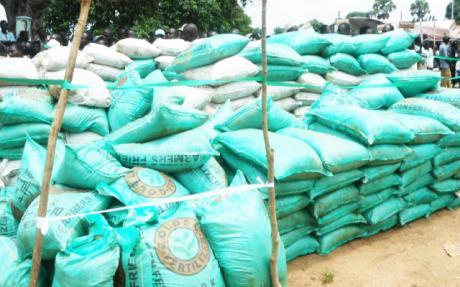Nigeria’s Presidential Fertilizer Initiative (PFI) has significantly boosted the nation’s fertilizer production and accessibility, demonstrating a strong commitment to food security. The Ministry of Finance Incorporated (MOFI) reported a substantial increase in the import of fertilizer raw materials, with over 560,000 metric tonnes received in 2025 alone, transported by at least ten vessels. This consistent inflow of raw materials fuels the robust local production and ensures uninterrupted supply across the fertilizer value chain, aligning with President Bola Tinubu’s vision for national food sovereignty. The PFI’s success underscores not only increased production volume but also enhanced resilience within the fertilizer supply chain, building confidence among farmers and industry stakeholders.
The PFI, a key component of Nigeria’s food security strategy, has progressed to a new phase known as PFI 3.0. This phase focuses intensely on establishing a sustainable supply of raw materials to blending plants across the country. The ultimate goal is to achieve self-sufficiency in crop production, catering to both domestic food needs and industrial applications. By September 2025, the quantity of raw materials secured, either through direct supply or pre-ordered shipments, surpassed the total amount supplied in 2024. Further agreements with fertilizer raw material manufacturers are in place to stock warehouses nationwide, guaranteeing blending plants access to raw materials commensurate with their production capacities. This reliable supply, underpinned by robust data and the PFI’s successful track record, reinforces confidence among farmers and investors in the agricultural sector.
The PFI stands as a successful example of public-private partnerships addressing complex national challenges. Dr. Armstrong Takang, Managing Director and CEO of MOFI, emphasizes the initiative’s role in creating a system resilient to global market fluctuations, enabling long-term agricultural planning. He views the PFI as a model for collaborative problem-solving with a promising future, showcasing Nigeria’s capacity for strategic reform. The PFI’s impact since its inception in 2016 has been instrumental in driving Nigeria’s food security agenda. Between 2021 and 2024, the initiative facilitated the production of over 4.5 million metric tonnes of finished fertilizer and delivered over 128 million bags of fertilizer directly to farmers.
The initiative has also catalyzed significant growth in local blending capacity. According to Sadiq Kassim, President of the Fertilizer Producers and Suppliers Association of Nigeria (FEPSAN), the number of active blending plants nationwide has surged to over 90, with a combined capacity to blend up to 13 million metric tonnes of fertilizer. This expanded capacity ensures consistent fertilizer availability for farmers, reduces transportation costs, and reinforces the nation’s fertilizer value chain. It also marks a significant step towards reducing import dependency and stimulating job creation across several states.
Despite the positive impact on supply stability, farmers continue to grapple with rising fertilizer prices, largely attributed to external factors such as foreign exchange volatility and global raw material price increases. Industry leaders emphasize that these price pressures stem from international market dynamics rather than domestic supply shortages. Recognizing these challenges, the Federal Government is actively implementing the third phase of the PFI. This phase, endorsed during the August 2025 Stakeholder Roundtable in Abuja, seeks to mitigate the impact of these external factors on farmers and strengthen the domestic fertilizer market.
Under PFI 3.0, MOFI will assume operational control of the initiative from the Nigeria Sovereign Investment Authority (NSIA), which has managed the program for almost a decade. MOFI’s takeover, scheduled for November 2025, will usher in a reformed phase focused on enhancing cost efficiency, improving supply chain traceability, and ensuring year-round fertilizer availability nationwide. These reforms are also designed to address issues such as hoarding and fertilizer diversion, which have sometimes hindered efficient distribution to farmers. With these strategic changes, the PFI is poised to further strengthen Nigeria’s agricultural sector and contribute significantly to the nation’s long-term food security goals.














